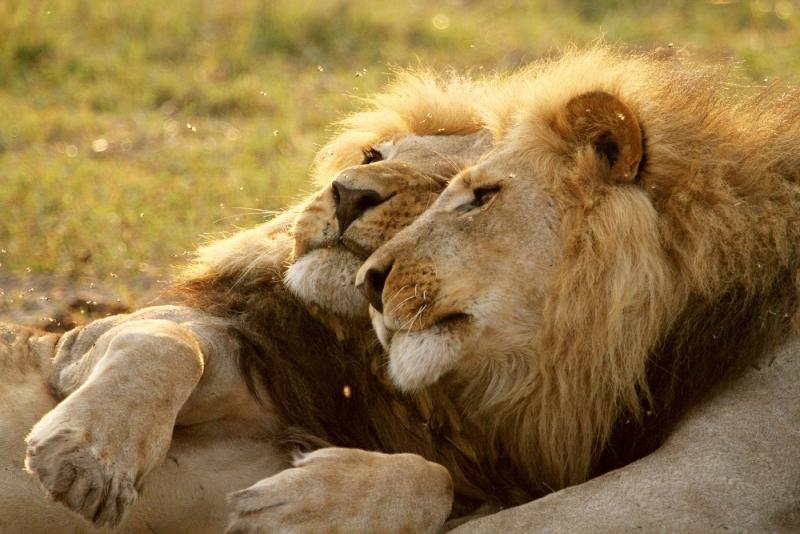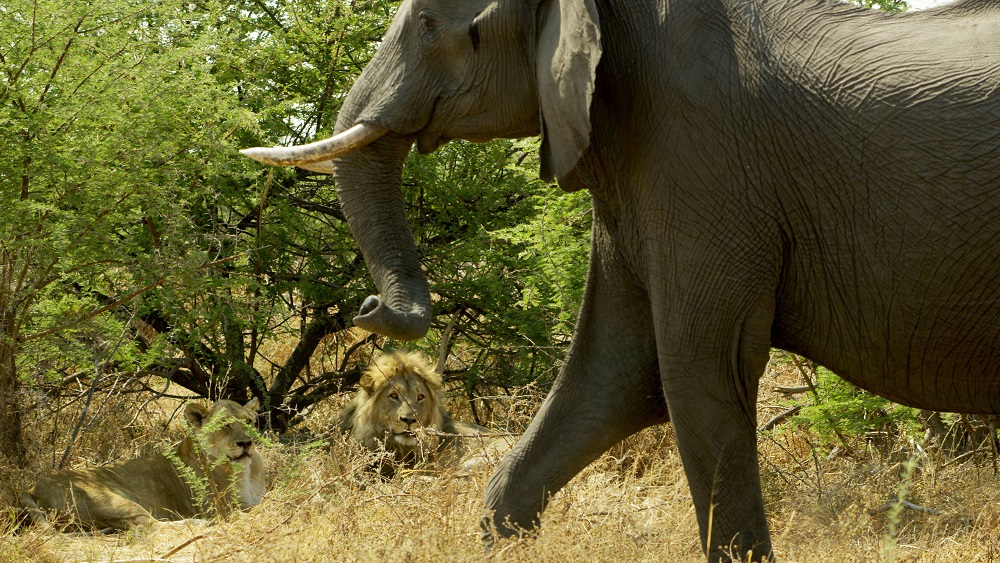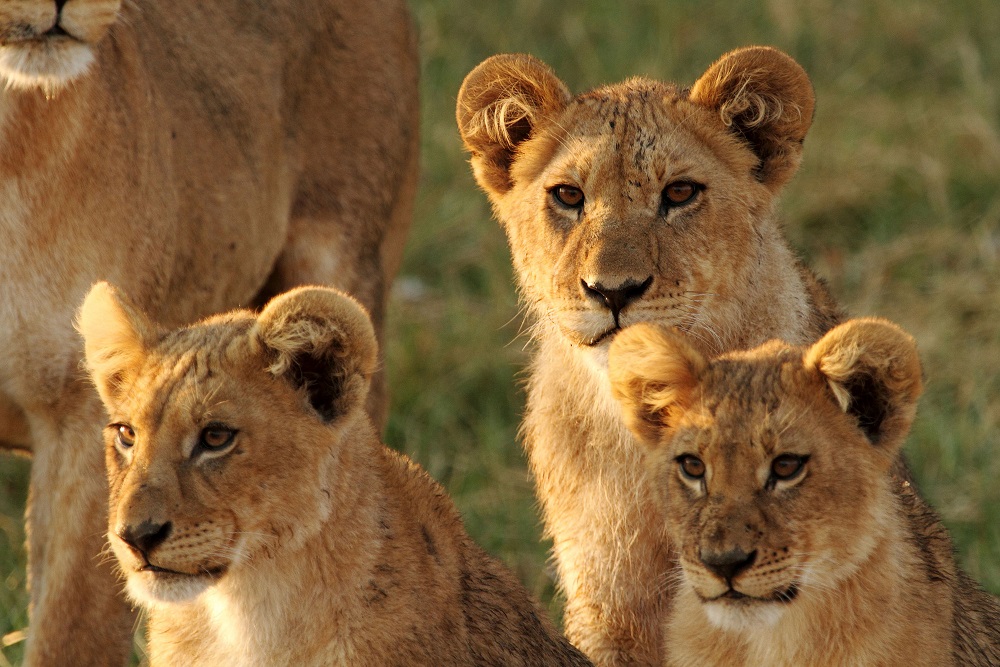Return of the Giant Killers: Africa's Lion Kings, BBC Two | reviews, news & interviews
Return of the Giant Killers: Africa's Lion Kings, BBC Two
Return of the Giant Killers: Africa's Lion Kings, BBC Two
More pride habits emerge as documentary makers return to Botswana

Dramatic music by William Goodchild underlined this narrative of wild life – nature vividly, even horrifyingly red in tooth and claw – of a surviving pride of lions in Botswana’s Savuti marsh, a wetland plain next to the Kalahari desert that attracts a huge range of animals.
The Savuti offers water in abundance and, in season, grazing for huge herds of buffalo as far as the eye can see: ambulatory food for predators. The scenery is magnificent, the sunsets gorgeous, the aerial views of the great sweeps of grassland captivating, the night time scenes eerily mesmerising. Life is harsh and unexpected, and the unstated parallels with human events slightly unnerving even without the anthropomorphism most of us cannot escape.
We actually seemed to watch her die with several hauntingly quiet soft roars
This Natural World film followed a specific pride of lions, but you didn’t have to be a feminist to be enraged at the programme’s title: it is the queens, that is the lionesses, who assume the leadership and control the hunt, although needless to say when rations are short the males take the best pickings. And the dominant pride was further messed up when the cooperation between five male siblings fractured and brother fought brother for dominance; three of the lions were forced out of the territory. It was feline civil war.
Further tragedy struck when the lead matriarchal lioness, the heroine of the previous television instalment of their story, died of old age with no apparent successor. We were shown her increasing fragility in the harsh conditions, and actually seemed to watch her die with several hauntingly quiet soft roars. And in another heartrending episode, an inexperienced young mother decided to rejoin the whole pride with her two one-month-old cubs, carrying the tiny creatures in her mouth one by one out from their hiding place. She decamped into the night to hunt, and returned to discover that three exuberant older cubs had killed her babies, by playing with the younger ones as though they were rag dolls.
 Meanwhile, cue dreadful drought in the Savuti, and the subsequent departure of the buffalo herds that normally provided food for the lions. The lions uncharacteristically focused on the elephants, normally free from predators but now trapped in the Savuti by their need for water (uneasy coexistence, pictured above). Which of the trio of mothers left in the pride, which crafty and courageous lioness, would now lead the hunt? Moreover, in a game described as lion chess we seemed to reach checkmate, or at least a standoff, when the three exiled lions returned to attempt to reclaim territory and face down the two brothers left as part of the original pride.
Meanwhile, cue dreadful drought in the Savuti, and the subsequent departure of the buffalo herds that normally provided food for the lions. The lions uncharacteristically focused on the elephants, normally free from predators but now trapped in the Savuti by their need for water (uneasy coexistence, pictured above). Which of the trio of mothers left in the pride, which crafty and courageous lioness, would now lead the hunt? Moreover, in a game described as lion chess we seemed to reach checkmate, or at least a standoff, when the three exiled lions returned to attempt to reclaim territory and face down the two brothers left as part of the original pride.
So we were in a tangle of domestic fracas, a dysfunctional family of big cats, and we saw one lion badly bloodied, another killed in a fight. Game was scarce, and at one point only a warthog was caught. Even the big horned buffalo managed to see the lions off, until one was downed – the lions' method being to divide and conquer by isolation, either a young or injured member of the herd. Then the herds left as the grasslands were burnt, a huge storm illuminating the marsh with its lightning strikes.
 Tantalisingly the big game that was left was very big indeed, the elephants. We went up to the wire, or rather to the end of the film's allocated hour, because we were told that the pride, once the success of the Savuti, was crumbling. The diminished family group had not learnt to cooperate, and the adolescent lions had not yet absorbed the lessons imparted by the elders. But then what? A young elephant was downed, and the last impressive shot was an aerial view of a group of lions munching on an unmistakeable elephantine carcass.
Tantalisingly the big game that was left was very big indeed, the elephants. We went up to the wire, or rather to the end of the film's allocated hour, because we were told that the pride, once the success of the Savuti, was crumbling. The diminished family group had not learnt to cooperate, and the adolescent lions had not yet absorbed the lessons imparted by the elders. But then what? A young elephant was downed, and the last impressive shot was an aerial view of a group of lions munching on an unmistakeable elephantine carcass.
How the story was spliced together, where in fact the pride went before a fall, before regrouping and triumphing once again as the top of the food chain in the Savuti marsh, was a modern day triumph of film making of a kind that we all tend to take for granted. But it was a bit hard to know what side to take as the elephants hardly seemed fair game, however admirable the courage and skill of their lion predators. It was awesome to see their leaps onto the elephant’s back, but as they started to crunch this viewer flinched.
At least nobody was named Cecil. And what the film showed us was that their lives are a combination of learnt skill, opportunity and luck, all at times sabotaged by what seemed self-destructive tendencies. Not so very far from home, then.
The future of Arts Journalism
You can stop theartsdesk.com closing!
We urgently need financing to survive. Our fundraising drive has thus far raised £49,000 but we need to reach £100,000 or we will be forced to close. Please contribute here: https://gofund.me/c3f6033d
And if you can forward this information to anyone who might assist, we’d be grateful.

Subscribe to theartsdesk.com
Thank you for continuing to read our work on theartsdesk.com. For unlimited access to every article in its entirety, including our archive of more than 15,000 pieces, we're asking for £5 per month or £40 per year. We feel it's a very good deal, and hope you do too.
To take a subscription now simply click here.
And if you're looking for that extra gift for a friend or family member, why not treat them to a theartsdesk.com gift subscription?
more
 'We are bowled over!' Thank you for your messages of love and support
Much-appreciated words of commendation from readers and the cultural community
'We are bowled over!' Thank you for your messages of love and support
Much-appreciated words of commendation from readers and the cultural community
 London Film Festival - from paranoia in Brazil and Iran, to light relief in New York and Tuscany
'Jay Kelly' disappoints, 'It Was Just an Accident' doesn't
London Film Festival - from paranoia in Brazil and Iran, to light relief in New York and Tuscany
'Jay Kelly' disappoints, 'It Was Just an Accident' doesn't
 Moroccan Gnawa comes to Manhattan with 'Saha Gnawa'
Trance and tradition meet Afrofuturism in Manhattan
Moroccan Gnawa comes to Manhattan with 'Saha Gnawa'
Trance and tradition meet Afrofuturism in Manhattan
 Albert Herring, English National Opera review - a great comedy with depths fully realised
Britten’s delight was never made for the Coliseum, but it works on its first outing there
Albert Herring, English National Opera review - a great comedy with depths fully realised
Britten’s delight was never made for the Coliseum, but it works on its first outing there
 Iron Ladies review - working-class heroines of the Miners' Strike
Documentary salutes the staunch women who fought Thatcher's pit closures
Iron Ladies review - working-class heroines of the Miners' Strike
Documentary salutes the staunch women who fought Thatcher's pit closures
 Blu-ray: The Man in the White Suit
Ealing Studios' prescient black comedy, as sharp as ever
Blu-ray: The Man in the White Suit
Ealing Studios' prescient black comedy, as sharp as ever
 Solomon, OAE, Butt, QEH review - daft Biblical whitewashing with great choruses
Even a top soprano and mezzo can’t make this Handel paean wholly convincing
Solomon, OAE, Butt, QEH review - daft Biblical whitewashing with great choruses
Even a top soprano and mezzo can’t make this Handel paean wholly convincing
 The Woman in Cabin 10 review - Scandi noir meets Agatha Christie on a superyacht
Reason goes overboard on a seagoing mystery thriller
The Woman in Cabin 10 review - Scandi noir meets Agatha Christie on a superyacht
Reason goes overboard on a seagoing mystery thriller
 Soulwax’s 'All Systems Are Lying' lays down some tasty yet gritty electro-pop
Belgian dancefloor veterans return to the fray with a dark, pop-orientated sound
Soulwax’s 'All Systems Are Lying' lays down some tasty yet gritty electro-pop
Belgian dancefloor veterans return to the fray with a dark, pop-orientated sound
 Two-Piano Gala, Kings Place review - shining constellations
London Piano Festival curators and illustrious friends entertain and enlighten
Two-Piano Gala, Kings Place review - shining constellations
London Piano Festival curators and illustrious friends entertain and enlighten
 Music Reissues Weekly: Marc and the Mambas - Three Black Nights Of Little Black Bites
When Marc Almond took time out from Soft Cell
Music Reissues Weekly: Marc and the Mambas - Three Black Nights Of Little Black Bites
When Marc Almond took time out from Soft Cell
 Troilus and Cressida, Globe Theatre review - a 'problem play' with added problems
Raucous and carnivalesque, but also ugly and incomprehensible
Troilus and Cressida, Globe Theatre review - a 'problem play' with added problems
Raucous and carnivalesque, but also ugly and incomprehensible

Add comment